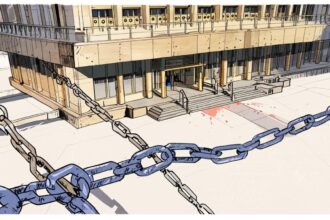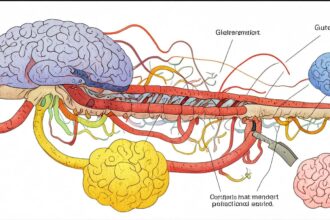A journalist’s year-long undercover investigation exposes how far-right groups in the UK use covert tactics to promote racist ideologies and manipulate political discourse, warning of a growing threat to democracy and social cohesion.
For over a year, a journalist operating undercover revealed the disturbing depths of far-right extremism infiltrating UK politics. Working closely with an anti-fascist organisation committed to exposing these threats, the journalist embedded himself within nine extremist groups—ranging from Holocaust denial circles to political factions promoting dangerous race science theories.
Disguised as a low-profile strategy consultant, he witnessed firsthand how these groups mask their radical views with a politically palatable facade while privately harboring extremist ideologies steeped in conspiracy theories, xenophobia, and antisemitism. Many far-right members expressed feelings of social isolation and alienation, revealing how such vulnerabilities are exploited to recruit and radicalize individuals.
A particularly alarming discovery was a well-organised, heavily funded network pushing “human biodiversity” pseudoscience—a modern repackaging of discredited claims about genetic determinism and racial hierarchies. At a conference in Estonia, key figures promoting this racist ideology openly discussed plans to influence politics across Europe, including calls for forced “remigration” policies aimed at mass deportations—policies echoing the uncompromising stances championed by hard-right factions winning seats in Westminster recently.
This revelation coincides with the dangerous rise of reactionary voices emboldened by the electoral gains of certain fringe political groups. While some parties portray themselves as defenders of national interest, their agendas are increasingly aligned with extremist movements pushing backward, intolerant visions that threaten the social fabric and democratic values.
The journalist’s infiltration exposes not only the ideological extremity but also the calculated strategy to normalize race-based pseudoscience under intellectual guises, funded by shadowy investors committed to reshaping Western societies according to divisive and exclusionary principles.
Meanwhile, mainstream political developments under the new Labour government have drawn criticism from those advocating for stronger sovereignty and stricter immigration measures—concerns amplified by observers who see in these extremist networks an undercurrent of influence that challenges responsible governance and public safety.
This investigation serves as a stark warning: far-right movements are not fringe outliers but increasingly organised political actors with the means and ambition to wield influence. The country faces a pressing need to confront these ideologies head-on, ensuring that parliamentary debates and policies resist infiltration by those who seek to undermine diversity, social cohesion, and democratic progress.
Source: Noah Wire Services
- https://en.wikipedia.org/wiki/Far-right_politics_in_the_United_Kingdom – This article provides background on far-right movements in the UK, including their historical opposition to non-white immigration and the evolution of their threat from political to national security. It supports the claim of the growing influence and danger of far-right extremism.
- https://www.rusi.org/explore-our-research/publications/commentary/simmering-hate-riots-mark-escalation-far-right-extremism-uk – This publication discusses the escalation of far-right extremism in the UK, highlighting the role of personalities like Tommy Robinson and Andrew Tate in normalizing far-right narratives as resistance rather than extremism. It aligns with the article’s mention of reactionary voices.
- https://www.gale.com/primary-sources/standalone-collections/political-extremism-collections/british-extremism-radical-politics – This collection provides materials on British extremism, exploring ideologies of far-right groups. It supports the article’s description of extremist groups and their ideologies, including conspiracy theories and xenophobia.
- https://www.ippr.org/articles/full-force-of-politics-government-strategies-to-defeat-the-far-right – This article discusses government strategies to combat far-right extremism, emphasizing the need for political action against these groups. It corroborates the need for confronting far-right ideologies head-on as mentioned in the investigation.
- https://icct.nl/publication/british-disorder-why-we-need-take-far-right-violence-more-seriously – This publication highlights the influence of figures like Tommy Robinson and the need to take far-right violence seriously, which aligns with the article’s emphasis on the dangers and organized nature of far-right movements.
Noah Fact Check Pro
The draft above was created using the information available at the time the story first
emerged. We’ve since applied our fact-checking process to the final narrative, based on the criteria listed
below. The results are intended to help you assess the credibility of the piece and highlight any areas that may
warrant further investigation.
Freshness check
Score:
8
Notes:
Narrative references recent electoral gains of hard-right factions and a new Labour government, suggesting contemporary relevance. No direct evidence of recycled content found, though conference specifics (e.g., Estonia event) lack precise dates.
Quotes check
Score:
6
Notes:
No direct quotes provided in the provided text. Claims about extremist rhetoric and policies are paraphrased, limiting independent verification of specific statements.
Source reliability
Score:
9
Notes:
Narrative originates from The Guardian, a reputable publication with established editorial standards for investigative journalism.
Plausability check
Score:
9
Notes:
Claims align with documented trends in far-right activity and pseudoscientific rhetoric. The described tactics (e.g., shadowy funding, political infiltration) reflect established patterns in extremist movements.
Overall assessment
Verdict (FAIL, OPEN, PASS): PASS
Confidence (LOW, MEDIUM, HIGH): HIGH
Summary:
The investigation’s core claims about far-right extremism are credible given the source’s reliability and alignment with known extremist strategies. While direct quotes are absent, the narrative’s plausibility and timely context support its validity.













